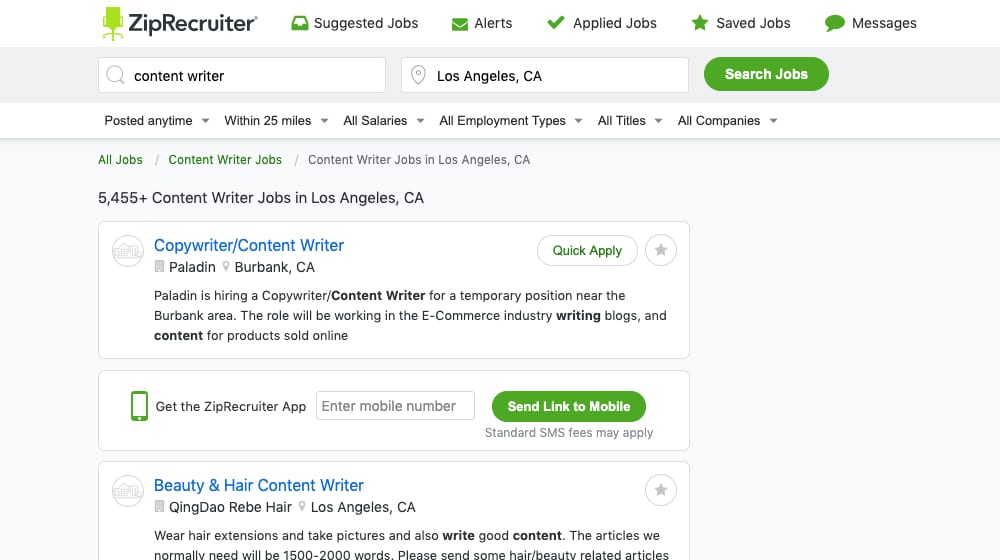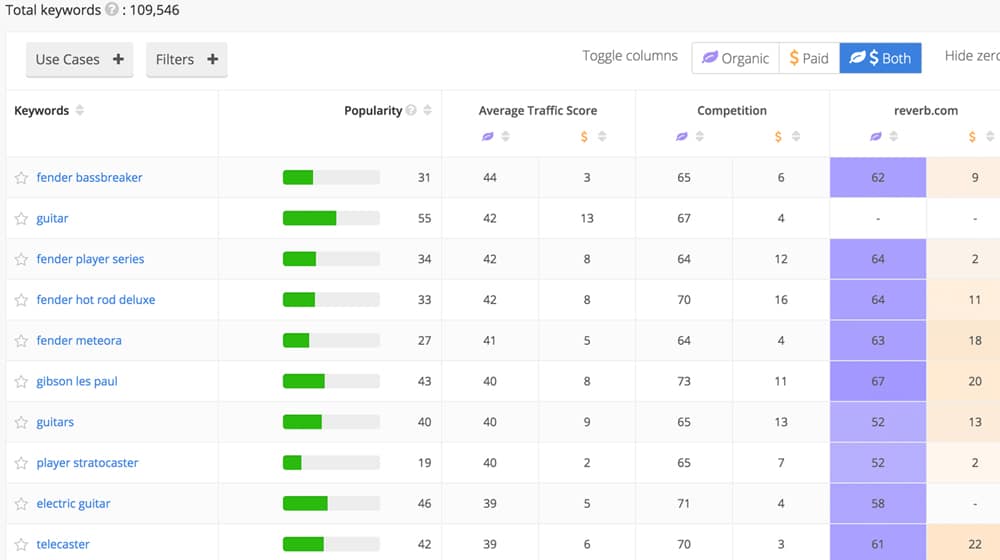15 Tips for Hiring a Content Writer for Your Blog

Keeping up with a blog is a lot of work. Even if you're knowledgeable about your subject and are a fluent writer, it can still take hours to write a blog post. Repeat that times three, five, seven, or more per week, and you're quickly approaching part-time job territory. It's no wonder that the majority of blog owners turn to professional writers to do the legwork for them.
I'm not going to try to convince you that you need a writer today. I assume that if you're here, you're already thinking of looking for one, and you want to figure out how to go about the process as effectively as possible.
I will warn you up front, however; you probably won't strike gold on your first attempt. There are thousands upon thousands of writers out there, and they vary wildly in terms of talent, skill, expertise, experience, and fluency. You might pick up a writer who turns out to be sub-par and not willing to improve. You might pick up a writer with a few samples that look promising, only to find they only have surface-level attention to detail and will never help your blog excel. You might even find someone who seems sub-par at first glance, and who flourishes when working with you.
Don't be afraid to pick up a writer and drop them later. You need to look out for your business first, and the feelings of your writers second. However, I will say one thing. Making your writers feel appreciated, giving them a chance to grow, and guiding them rather than admonishing them can have a brilliant effect.
The same goes for all of your employees. Study after study is showing, more and more, that treating your employees well boosts productivity. While your bottom line is important, so too is the well-being of your employees.
So how can you look for a writer? Here are my tips, as someone who has gone through this process over and over for years, with all levels of success.
 30 Second Summary
30 Second Summary
You need a consistent flow of quality blog content, and finding the right writer can be challenging. You'll want to decide between hiring freelancers, employees or agencies based on your budget and needs. When searching for writers, you should look for native-level English speakers who know your industry and understand basic SEO. You have to be clear about pay rates and expectations upfront. You'll get better results if you test writers with paid sample articles and give them time to learn your style. It's smart to hire multiple writers as backup.
1. Consider a Content Mill
First of all, one thing you can consider is a content mill. There are a lot of different sites out there that leverage their own pools of writers and allow you to submit assignments, to be picked up and written by their writers.
"But all of the content you get from content mills sucks!" I can hear you saying already. A lot of the time, that's true. However, since 2011 killed the lowest quality blogs and quality standards have been rising every year, you'll find that content mills have improved quite a bit.

Content mills have three primary drawbacks.
- You're paying for the platform. Every content mill takes their cut, and that cut can sometimes be very significant. You might end up paying double or even triple what the writer is paid for the content.
- You're not always able to choose your writers. Most content mills have "open pools" where you submit an assignment and anyone can pick it up. This means you might get a brilliant writer one day and an ESL penny-spinner the next. You can often hire writers directly, but it may cost more and they may not always be available.
- You can't build a relationship as easily. Most content mills make it difficult to contact their writers in any way other than through their platform, to avoid poaching their good writers. This makes it difficult if you want to take them on for better roles or hire them as employees.
Content mills can have their roles, but they aren't always ideal. It might be worth a try, especially if you're in between writers or just want to see what kind of content you can get out of them. Try out sites like Textbroker, Writer Access, Constant Content, and Verblio.
2: Consider the Differences: Employee, Freelancer, Agency
If you don't want to just purchase content and instead want to hire a writer, you have three options.
Contract a freelancer. Freelancers are often cheapest, but they might be the least consistent. Freelancers often work with multiple clients and may not always have space for your work, and can leave whenever they find better contracts and need to drop someone to make room.
Hire an employee. Writers as employees tend to cost more – and depending on the size of your business, you may need to pay benefits as well – but they are more consistent and have a closer relationship with your business. Since they become part of your business, they are often more invested in its success.

Contract an agency. Agencies (like us!) have their own professional writers on staff or on contract, and usually have a high level of specific expertise. They also often do other blog management tasks, like handling images, posting updates, and refining meta data. However, they will definitely cost the most. They're ideal if you want to be hands-off and have the budget to pull it off.
Consider what level of management you want, how much consistency you want, and how much of the work you want to do yourself.
3. Make Sure to Manage Expectations
One additional consideration to keep in mind is whether you're hiring a writer or you're hiring a blogger. You'd think they were the same, right? Not quite.
Writers write. They can produce excellent content for you, but that's probably where it ends. They aren't likely to want to deal with meta data, they don't want to do the keyword research or mess with social media tools. They're brilliant at what they do, when you find a good one, but you still have to handle a lot of additional work yourself.
Bloggers, meanwhile, know all of the quirks of running a blog. They won't just deliver a document to you, they'll be able to brainstorm ideas, research keywords, manage your blog meta data, and so on. These are more valuable, but more expensive.
Make sure to know what you want up front. Don't try to get a writer to do something they aren't comfortable with, at least not without additional training. Your results are likely to be sub-par.
4. Know Your Budget, and Be Up Front
This one is simple. Know how much you're willing to pay for your content, and be up front about it.
Blog writers, particularly freelancers, tend to work by the word or by the piece. For example, they might charge you 5 cents per word, or they might charge you $200 for a blog post around 1,500 words long.
Pricing can vary dramatically depending on the writer's skill level, their self-esteem, their other clients, and even their location. A remote writer living in Los Angeles is going to cost way more than a remote writer living in rural Maine.

I've seen pricing as low as 1-2 cents per word, and as high as $1 per word for premium content. I've even seen higher prices for extremely good freelancers, the kind with name recognition. Know your budget, so you know what kinds of writers to look for.
5. Look for a Native English Speaker
This one might be a bit of a controversial tip, but bear with me. Blogging, particularly in some niches, is absolutely saturated with content. Your content needs to stand out in some positive way to gain any traction or traffic. You need a writer fluent with your language to create that kind of content.
I say native here, but you don't actually need a native English speaker; just someone who is fluent enough to produce such high quality content. This, and several other tips on this list, can be tested with sample articles. See more on that in number 13 on this list.
6. Ask the Right Questions
When you find a writer you'd like to interview for your position, you can go about it in different ways. Some people prefer to just give the writer a few test articles and then judge what they produce. Some prefer to treat it as more of a job interview, complete with tricky questions to ask.
I'm somewhere in the middle. I find that interviews can help you weed out a few of the worst potential contracts, but they can only tell you so much. Plus, the kinds of people who become writers are often introverts who aren't all that skilled with phone interviews or Skype calls. Some of my best writers are people I've never talked to outside of email and text chats.

We create blog content that converts - not just for ourselves, but for our clients, too.
We pick blog topics like hedge funds pick stocks. Then, we create articles that are 10x better to earn the top spot.
Content marketing has two ingredients - content and marketing. We've earned our black belts in both.
If you want to ask writers interview-style questions, this article from The Content Factory has a lot of good ones. I've used a few of them myself.
7. Look for Someone Knowledgeable About Your Industry
Some writers try to be generalists, and some are very good at it, but most will have a specialty. When recruiting writers for my agency, I try to gather writers with a variety of different specialties, so no matter who I work with, I have at least one expert on hand to write tailored, innovative content.
The problem with a lot of generalist writers is that they only writer surface-level content. A generalist writer writing something for a marketing blog might write a basic guide to SEO, or a guide to on-site meta data, or a comparison of Analytics apps, and so on. These sound great, but they all exist in great depth from existing sites. They aren't novel, and a generalist writer isn't likely to be able to put a unique spin on the topic.
Now, if you work with a writer for a long time, it's possible to train them to have greater knowledge of the subject, and they'll naturally learn over time. It's simply the difference between wading into the pool and jumping in the deep end.
8. Look for Someone Who Knows SEO Basics
You don't always need a writer with intimate knowledge of the intricacies of SEO, unless you're a marketing blog and that's the expertise you're looking for. What you do want, however, is a writer who knows the basics of using keywords and keyword synonyms, how to write for the web with shorter paragraphs and skimmable formatting, how to write descriptive anchor text, how to research topic comptition and traffic, and other basics.

This is why I always hesitate to hire writers who have a majority of their experience with academic writing. Academic writing tends to be longer, dryer, and denser, which isn't great for web content. It's a unique world out there, and you want writers experienced with what people want.
If your blog post isn't written with at least some SEO in mind, it is far less likely to succeed. You need to be writing about something that is actually being searched, or else it just isn't going to get seen.
9. Allow for Training Time
I've found that the best writers rarely start out at the top of their game. Sure, there are the top-tier professionals who are always at the top of their game, but with them, you know what you're getting into. For writers who haven't built up a brand name for themselves, you'll often find there's a period of growth and adjustment.
What this means is that you're going to need to train your writers, and your writers will learn to write what you want written. Give them time to adapt to the style you want, to learn your needs, and to produce the content you want produced. With luck, after a few months, you'll have a writer perfectly in tune with your style and your niche.
10. It's Hard to Find a Jack of All Trades
I mentioned this in passing up above, the difference between a writer and a blogger. I've seen people try to hire writers and then foist a bunch of added responsibilities on them. Sometimes it works, but most of the time the writer finds a reason to bail once they have a client that just wants what they're good at.

It's one thing to have a writer handle things like links in your posts, formatting, and editing. It's another thing entirely to try to get your writer to also handle blog images and meta data. What you'll end up with is a writer who has to put more time and effort into images than their writing, and the writing will suffer. Meanwhile, the images could be stolen – if they aren't aware of copyright for web images – or just sub-par. It's better to hire two dedicated specialists than one generalist.
11. Keep Speed and Accuracy in Mind
With new writers, one thing you want to reinforce is deadlines and timely delivery. Running a blog requires a constant flow of content published on a regular basis. You'll need to set and reinforce deadlines for writing. Make sure your writers don't miss deadlines, or if they do, that they have a good reason for it.
There's something to be said for developing a casual relationship with your writers, to support them when they're going through issues or may need to be late with the occasional post. You just have to watch out for the unscrupulous people who might take advantage of that leniency. The occasional late post is fine, especially if you build a backlog. Consistent late work is cause for alarm and, eventually, cutting contract.
12. Find Someone with a Passion for Writing
This one is hard to identify. Writers who are marketing themselves will certainly claim they have a passion for writing, but do they really? Are they writing because they enjoy it, or are they just trying to make ends meet and doing one thing they can do from home, remotely?

I've found that talking to writers about side projects and passion projects helps you identify this. Do they write poetry, novels, short stories? Non-contract writing is a sign that a writer is both good at what they do and passionate about it.
Additionally, talking to your writers about their passion projects helps build rapport with them and helps you establish a relationship. This makes them feel more comfortable working with you, especially if you're lenient in other ways and pay well.
13. Leverage Test Articles (And Pay for Them)
How can you test any of the qualities I've mentioned above? Test articles! Come up with assignments – preferably real blog posts you want written, not generic posts or duplicate ideas that would be wasted if more than one writer produces satisfactory content – and ask your potential writer to write them for you.
I like to ask for 2-3 test articles from a writer before I decide whether or not I want to keep working with them. One test is easy; they'll focus on it and they'll knock something out of the park, because it's a make or break for a contract. Three means you have more variation, particularly if you try to spice up the topics.
I like to make one a relatively general article, something that showcases their ability to research or their knowledge of the topic. A second should be a deep dive into a topic so you can see how the writer handles depth, and the third can be a broad overview, a tutorial, a comparison piece, or something more specific for your blogging needs.
Always pay for your test articles, and be up front that it's paying work before you go into details. A lot of writers, particularly the good, experienced sort, are wary of writing anything they aren't paid for. Unfortunately, there are a lot of bad actors out there who will ask for pitches and then use those pitches without paying for them or hiring the writer.
14. Develop the Right Relationship
How casual or official do you want your relationship with your writer to be? I've had successful contracts with writers where I never sent them a single message beyond the topics I wanted them to write, and they sent back posts. I've also had successful relationships with writers who became friends. Figure out what you're comfortable with, and what the writer is comfortable with, and work out a middle ground. A comfortable writer is an effective writer.
15. Hire More Than One Writer
Putting all of your eggs in one basket, so to speak, is never a good idea. Relying on one writer, particularly if they're a freelancer on contract, is risky. They could always drop off the face of the earth, either because of a change in life circumstances or a better contract coming their way. Employees are better, but you can still have major unforeseen circumstances disrupt the relationship.

Hiring several writers allows you to have backup writers when your primary writer needs a vacation, and it allows you to publish more content without overloading any one person. It's generally good practice, and it helps smooth over transitions if a writer leaves and you need to find a new one.
Alternatively, of course, you can simply contract an agency. Agencies (like ours) have a pantheon of writers on hand, always ready to pick up any potential slack. Why not give it a look?



 30 Second Summary
30 Second Summary


August 14, 2020
For me, it was best to hire an agency. Getting a freelancer is cheaper but there's too much risk involved. I have an awful experience of getting a freelancer and paying 5 cents per word but what I received sounded funny and just droned on and on... I paid for the post but was not able to use it and worst part was I wasn't able to follow my timeline since I need to look for another writer to rewrite it in a short period of time. Agencies have specialists for certain topics and they seem to handle revisions better when you have that open line of communication.
August 14, 2020
Hey Blair! Interesting, 5 cents per word isn't the worst I've seen, but it all depends on the writer and how much they've actually looked into a topic. The problem with content mills is there's no accountability, the names on Textbroker are things like "Writer-1084381", so if the article isn't very good and you rate them poorly they can just create a new account. Agencies have a reputation to uphold, so their work is generally going to be better. Which agency did you end up going with?
August 21, 2020
I hired writers using Upwork and so far it works. The only problem I encountered with hiring a freelancer is that they are not focused on my blog as they are handling several other blogs. But overall it's working okay.
August 22, 2020
Hi Robert! You could always try testing other writers on the side to see if you can find someone who has more time for your site. Good writers are hard to come by, so when you find one hold onto them and never let them go. We have a very tough interview process for our writers for that reason, there are a ton of available writers but the best ones get snatched up quickly. Sometimes it takes a little trial and error to find someone. If you ever need help with your blog, drop us a line!
September 23, 2024
How do you handle deadlines with freelancers? It's been tough for me
September 27, 2024
Hey there Tonita!
Deadlines can be pretty difficult with freelancers right? I always set clear expectations at the start and this really helps quite a bit.
I also use milestone deadlines to keep everything on track and have regular check-ins. You're probably already doing this but keeping communication open makes a huge difference.
Have you tried project management tools? They work very well for me! You might want to ask about their preferred working style too.
Good luck! Let me know if you need any more tips.
October 19, 2020
I usually hire the lowest, medium and highest writer and check how well they work for that month. If I see that we are not a good fit, I don't re-hire them. But funny thing is, the lowest-paid freelancer was the one who remained with me until now. It's not because her rate is lower but because she's really good and seems like we are a perfect match. I offered her a full-time job and give her the salary she deserves. Sometimes, you just really have to do trial and error to see if the person is a good fit for your business
October 26, 2020
Hey Nathan!
You're right, pricing isn't always an indication of quality, though on crowd-sourced sites, it usually is - primarily due to the writer tests. The highest-scoring writers are the most expensive, and the lowest scoring-writers are the cheapest. Generally, the ones that did better on the test are going to write better articles.
I'm glad you found a talented writer, hang onto her!
October 06, 2024
Did you see any big differences in how they write
October 08, 2024
Hey Truman!
You definitely notice big differences in their writing styles! Some are great storytellers while others are clear with technical details. It really depends on their background and expertise. Platforms like Shopify or HubSpot can show this diversity and help with engagement.
Curious about what kind of content you're looking to produce? 😊
Feel free to reach out if you have more questions!
May 28, 2021
Thanks for sharing this. How much should I pay for the test article? Also, if I like to publish the test article, should I add more payment to the writer?
May 28, 2021
Hey Ernest!
Pricing should be negotiated with the writer directly. I wrote a guide on this subject not too long ago:
https://www.contentpowered.com/blog/blog-posts-spend-costs/
I hope it helps you!